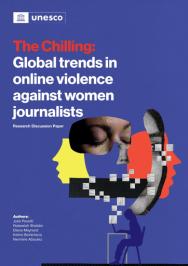News
Online Violence is Violence

On 21 February 2023, UNESCO and IREX, a global development and education organization, convened a panel session on psychosocial effects of online violence on journalists. The discussion, which was part of the UNESCO’s Global Conference “Internet for Trust” (21-23 February 2023, Paris) highlighted the need for trauma-informed approaches to journalist safety, as well as the direct link between online attacks against on journalists and self-censorship.
Javeria Siddique, a Pakistani journalist and photographer, described how she was targeted by online trolls while calling attention to her husband Arshad Sharif’s murder in Kenya in October 2022. The attackers targeted her on a personal level, trying “character assassination” in an attempt to “keep me silent”.
According to Elodie Vialle, a journalist safety specialist, such online attacks are part of an “organized tactic to muzzle journalists”, emphasizing the chilling effect on freedom of expression. Vialle also expressed that “self-care and mental health are still a little bit taboo in the journalistic community, but we need to discuss it more”. She called for newsrooms to take a trauma-informed approach and provide mental health support to journalists.
Clinical psychologist and IREX safety trainer Aya Mhanna explained that journalists are frequently subjected to victim blaming, which leads to a sense of helplessness. She reminded that violence affects all aspects of journalists’ lives, including their financial stability. This affects all journalists, with women targeted by sexist and sexualized violence, and “alarming rates of suicide, for example among LGBTQI+ journalists” according to Mhanna.
Ephraim Muchemi, East Africa Deputy Center Manager of the IREX SAFE Initiative illustrated the specific challenges in the region where people have “poor digital literacy”, “poor assistance from the social media companies which don’t have capacities in local languages”, “lack of therapists” as well as “lack of capacity among therapists”.
The panelists identified elements that should be implemented to mitigate and address the mental health consequences of violence against journalists, including:
- Increasing awareness of online violence as a serious issue with potentially life-threatening consequences for journalists and an alarming effect on freedom of expression.
- Promoting a trauma-informed approach and understanding of trauma among journalists, media outlets, donors, governments, organizations, and other stakeholders.
- Media organizations must implement protocols that actively encourage journalists to discuss mental health and provide assistance in the event of an attack.
- Social media platforms must bear a significant amount of responsibility for combating online abuse.
- Social media platforms must improve their linguistic capabilities in order to assist victims of online violence globally.
- Increasing therapists’ capacity and providing training on working with affected journalists.








